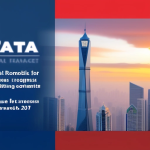Upskilling for Success: A Guide to Specialized Training Programs for OFWs in Healthcare, IT, and Construction
Introduction: The Imperative of Upskilling for OFWs
The dream of a better life abroad fuels the aspirations of countless Filipinos, leading them to seek opportunities as Overseas Filipino Workers (OFWs). However, navigating the complexities of the global job market requires more than just a willingness to work hard. In an era defined by rapid technological advancements and evolving industry demands, upskilling has become paramount for OFWs aiming to not only secure employment but also thrive in their chosen fields. This article serves as a comprehensive guide to specialized training programs in Healthcare, IT, and Construction – three sectors with consistently high demand in major OFW destination countries.
We will explore reputable training options, discuss the benefits of upskilling, offer practical advice on choosing the right programs, and provide information on financial assistance, all while considering the regulatory landscape shaped by the Philippine Regulation Commission (PRC) and global technological shifts. For overseas Filipino workers, the pursuit of enhanced skills translates directly into increased competitiveness in the global job market. OFW training programs, particularly those focused on specialized areas within healthcare, IT, and construction, are crucial for securing better OFW jobs and career advancement.
The demand for skilled labor in countries like Saudi Arabia, the UAE, Canada, Singapore, and the UK is constantly evolving, necessitating continuous learning and adaptation. Understanding the specific requirements and certifications recognized in these regions, such as NCLEX for nurses seeking opportunities in North America or BIM certification for construction professionals aiming for projects in Singapore, is essential for career success. Resources from TESDA and OWWA play a vital role in making these opportunities accessible.
Skill enhancement and professional certifications are not merely about acquiring new knowledge; they represent a strategic investment in one’s career trajectory. Upskilling for OFWs provides a pathway to higher-paying positions, greater job security, and increased opportunities for career advancement. The healthcare sector, for example, offers numerous avenues for specialization, from advanced nursing certifications to specialized training in medical technology. Similarly, the IT sector demands expertise in emerging technologies such as cloud computing, cybersecurity, and data analytics.
Construction professionals can benefit from certifications in project management, sustainable building practices, and the use of advanced software. These specialized skills not only enhance employability but also position OFWs as valuable assets in their respective fields. Moreover, the integration of AI-powered translation and personalized learning platforms is revolutionizing the way OFWs access and engage with training materials. AI-powered personalized learning for OFWs can tailor educational content to individual learning styles and paces, maximizing knowledge retention and skill development. Furthermore, AI-powered translation tools break down language barriers, making global training resources more accessible to a wider audience of overseas Filipino workers. This democratization of knowledge empowers OFWs to pursue upskilling opportunities regardless of their geographical location or linguistic background, fostering a more inclusive and equitable global workforce. As technology continues to advance, embracing these AI-driven tools will be crucial for OFWs seeking to stay ahead in their careers and capitalize on emerging opportunities.
Global Demand for Skilled Workers: Healthcare, IT, and Construction
The global demand for skilled workers fluctuates, but Healthcare, IT, and Construction remain consistently strong sectors for overseas Filipino workers. Understanding these specific demands is the first step for OFWs in identifying the right upskilling for OFWs opportunities. Each sector presents unique challenges and prospects, requiring targeted OFW training programs to enhance competitiveness and secure desirable OFW jobs. The Philippine government, through agencies like TESDA and OWWA, offers various initiatives to support overseas Filipino workers in acquiring these essential skills, but understanding the nuances of each industry is crucial for maximizing these opportunities.
Furthermore, AI-powered translation tools are becoming increasingly vital for OFWs to navigate language barriers and access international training resources effectively. In Healthcare, countries like Saudi Arabia, the UAE, the UK, and Canada are facing aging populations and increasing healthcare needs, creating a significant demand for nurses, medical technicians, and other healthcare professionals. The Philippines is a major source of healthcare workers, but competition is fierce. Specific skills in areas like geriatric care, specialized nursing (e.g., ICU, ER), and telehealth are highly valued.
The PRC, or Philippine Regulation Commission, plays a vital role in ensuring Filipino healthcare professionals meet international standards through rigorous licensing exams and continuing professional development requirements. For nurses aiming to work in the US or Canada, passing the NCLEX exam is a critical step, making NCLEX review courses a worthwhile investment. Healthcare training for OFWs must therefore focus on internationally recognized certifications and specialized skills to stand out in a competitive global market. Singapore, Canada, the US, and Australia are experiencing rapid growth in their IT sectors, leading to a high demand for software developers, data scientists, cybersecurity experts, and network engineers.
Filipino IT professionals with expertise in emerging technologies like AI, blockchain, and cloud computing are particularly sought after. IT training for OFWs should prioritize these cutting-edge skills to meet the evolving needs of the global tech industry. Furthermore, initiatives promoting digital literacy and advanced coding skills can significantly enhance the employability of overseas Filipino workers in the IT sector. The integration of AI-powered personalized learning platforms can also tailor training programs to individual skill levels and career aspirations, maximizing the effectiveness of upskilling efforts.
This personalized approach ensures that OFWs acquire the specific competencies needed to excel in their chosen IT roles. The Middle East (particularly Saudi Arabia and the UAE) continues to invest heavily in infrastructure projects, driving demand for skilled construction workers, including engineers, architects, electricians, plumbers, and heavy equipment operators. Canada and Australia also have robust construction industries. Specialized skills in areas like sustainable construction, BIM (Building Information Modeling), and project management are increasingly important. Construction training for OFWs must therefore emphasize these specialized areas to align with current industry trends and demands. Acquiring BIM certification, for example, can significantly enhance an OFW’s career prospects in modern construction projects. By focusing on these in-demand skills, overseas Filipino workers can secure better-paying jobs and contribute to the advancement of the construction industry worldwide.
Specialized Training Programs: Options and Opportunities
Numerous training programs cater to OFWs seeking to enhance their skills in these sectors. Here’s a detailed look at some reputable options, focusing on how these programs directly translate to enhanced OFW jobs prospects and career development opportunities for overseas Filipino workers: Healthcare: For OFWs aspiring to work in healthcare, particularly in countries like Saudi Arabia, the UAE, Canada, and the UK, specific certifications and training are paramount. NCLEX-RN Review Courses are essential for nurses targeting the US and Canada, with providers like Kaplan and Becker Professional Education offering comprehensive programs alongside local review centers in the Philippines.
These courses, costing between PHP 20,000 and PHP 50,000, prepare nurses for the rigorous NCLEX examination, a crucial step towards licensure. Specialized Nursing Certifications from organizations like the American Nurses Credentialing Center (ANCC) in areas such as critical care, oncology, and gerontology further enhance career prospects, demonstrating advanced knowledge and skills valued by employers. The Philippine Regulation Commission (PRC) also offers relevant certifications that align with international standards, making OFW nurses more competitive in the global market.
Furthermore, the rise of telehealth presents new avenues; online courses in telehealth principles and practices, available on platforms like Coursera and edX, equip healthcare professionals with the skills to provide remote care, a growing trend in healthcare systems worldwide. These healthcare training for OFWs not only increase earning potential but also open doors to specialized roles and career advancement. IT: The IT sector offers diverse opportunities for upskilling for OFWs, leading to high-demand OFW jobs.
Coding Bootcamps provide intensive training in in-demand coding skills, with providers like General Assembly, Flatiron School, and local bootcamps in the Philippines. These programs, ranging from PHP 50,000 to PHP 200,000, equip individuals with the practical skills needed to enter the tech industry. Cloud Computing Certifications from Amazon Web Services (AWS), Microsoft Azure, and Google Cloud are highly valued, demonstrating expertise in managing and deploying cloud-based solutions. These certifications are particularly relevant as more companies migrate to the cloud, creating a significant demand for skilled professionals.
Cybersecurity Certifications such as CompTIA Security+, CISSP, and CISM are also crucial, given the increasing importance of protecting data and systems from cyber threats. These IT training for OFWs are essential for staying competitive in the rapidly evolving tech landscape, allowing OFWs to secure high-paying jobs and advance their careers. AI-powered translation tools are also increasingly important in this field, enabling seamless communication and collaboration across global teams, further enhancing the value of IT professionals.
Construction: The construction industry, while physically demanding, offers stable employment opportunities for OFWs with the right skills and certifications. TESDA vocational training provides a wide range of construction-related skills, such as carpentry, plumbing, electrical installation, and welding. These programs are relatively low-cost, and scholarships are often available, making them accessible to a broad range of individuals. BIM certification is increasingly valued, reflecting the industry’s shift towards digital construction methods. Providers like Autodesk and Bentley Systems offer certifications that demonstrate proficiency in using BIM software, enhancing employability and project efficiency.
The Project Management Professional (PMP) certification, offered by the Project Management Institute (PMI), is globally recognized and highly sought after for project managers. This certification validates expertise in project management methodologies and best practices, increasing earning potential and career advancement opportunities. These construction training for OFWs are vital for ensuring that workers have the skills and knowledge needed to meet the demands of modern construction projects, both domestically and internationally. OWWA also provides support and resources to help OFWs access these training programs, further promoting skill enhancement and career development. AI-Powered Personalized Learning for OFWs can also play a role in tailoring training to individual needs and learning styles, maximizing the effectiveness of upskilling efforts.
The Benefits of Upskilling: A Pathway to Success
Upskilling offers numerous benefits for OFWs, directly impacting their earning potential and career trajectory. Skilled workers command higher salaries, reflecting the value they bring to employers. For instance, a nurse with a specialized certification in critical care can earn significantly more than a general nurse, especially in high-demand locations like Saudi Arabia, the UAE, Canada, or the UK. Similarly, an IT professional proficient in cloud computing or cybersecurity will be more valuable than one without, opening doors to lucrative OFW jobs in Singapore and other tech hubs.
This increased earning potential directly translates to improved financial security for overseas Filipino workers and their families back home. Career advancement is another significant advantage of upskilling for OFWs. Acquiring new skills and certifications opens doors to promotions and leadership roles that might otherwise be inaccessible. A construction worker with BIM certification, for example, can advance to a project management position, overseeing complex projects and commanding a higher salary. In the healthcare sector, specialized training can lead to roles as charge nurses or nurse supervisors.
By investing in upskilling for OFWs, individuals demonstrate a commitment to professional growth, making them prime candidates for career advancement within their respective fields. Improved job security and enhanced employability are crucial benefits in today’s competitive global market. In sectors like IT and construction, where technology is constantly evolving, upskilling for OFWs ensures that workers remain relevant and adaptable. Employers prioritize retaining employees with in-demand skills, making skilled workers less likely to be laid off during economic downturns.
Furthermore, upskilling makes overseas Filipino workers more attractive to potential employers. A well-trained and certified worker stands out from the competition, increasing their chances of securing desirable OFW jobs. Accessing OFW training programs, whether through TESDA, OWWA, or private institutions, is an investment in long-term job security and career success. Beyond the tangible benefits of increased earning potential and career advancement, upskilling fosters personal growth and boosts confidence. Learning new skills provides a sense of accomplishment and empowers OFWs to take control of their careers.
AI-powered personalized learning platforms can further enhance this process by tailoring training programs to individual needs and learning styles. This personalized approach ensures that overseas Filipino workers acquire the specific skills and knowledge required to succeed in their chosen fields. Moreover, AI-powered translation tools can bridge language barriers, making global opportunities more accessible to OFWs. To identify the right training programs, OFWs should consider their existing skills, experience, career goals, and the specific demands of the target job market.
Researching job postings and networking with industry professionals can provide valuable insights. For healthcare professionals, understanding the Philippine Regulation Commission (PRC)’s requirements for professional licensing and certifications like the NCLEX is crucial. Similarly, construction workers should investigate industry-recognized certifications that align with their career aspirations. Government initiatives, such as TESDA and OWWA scholarships, can provide financial assistance to help OFWs access quality healthcare training for OFWs, IT training for OFWs, and construction training for OFWs.
Financial Assistance and Success Stories: Making Upskilling Accessible
Financial constraints can be a significant barrier to upskilling, hindering many overseas Filipino workers from accessing crucial training programs. Fortunately, several financial assistance options are available for OFWs seeking to enhance their skills and career prospects. The Overseas Workers Welfare Administration (OWWA) offers scholarships for OFWs and their dependents, a valuable resource often underutilized. These scholarships can substantially alleviate the financial burden by covering tuition fees, assessment costs, and other educational expenses associated with OFW training programs designed to improve skills for better OFW jobs.
Similarly, TESDA provides scholarships for a wide array of vocational training programs relevant to overseas Filipino workers, particularly those seeking certifications in construction, automotive, and other technical fields. These TESDA programs are strategically designed to align with the demands of the global job market, increasing the employability of OFWs. Banks in the Philippines also recognize the importance of upskilling for OFWs and offer specialized loan programs tailored to finance education and training initiatives. Furthermore, it’s worthwhile for OFWs to explore the possibility of employer sponsorship, as some companies are willing to invest in their employees’ professional development by covering the costs of relevant training.
This is particularly common in sectors facing skills shortages, such as healthcare and IT. For instance, some hospitals in Saudi Arabia, the UAE, Canada, Singapore, and the UK may sponsor nurses to obtain NCLEX certifications or specialized training in areas like critical care or operating room nursing. In the construction sector, companies might sponsor employees for BIM certification programs. Actively seeking these various financial aid avenues is a crucial first step towards unlocking upskilling opportunities.
Success stories abound, illustrating the transformative power of upskilling for OFWs. Maria, a former domestic helper in Hong Kong, leveraged online courses in web development and is now thriving as a freelance web developer, earning significantly more and enjoying greater autonomy. Her story is a testament to the accessibility and effectiveness of online learning platforms, particularly those offering AI-powered personalized learning paths tailored to individual skill gaps. John, a construction worker in Saudi Arabia, invested in a BIM certification, significantly boosting his career trajectory; he now excels as a project manager for a major construction company, demonstrating how specialized certifications can lead to substantial career advancement.
These narratives highlight the importance of strategic skill enhancement aligned with global demands. The Philippine Regulation Commission also plays a vital role in accrediting professionals, ensuring that OFWs meet international standards. Upskilling is not merely about acquiring new skills; it’s a strategic investment in oneself, paving the way for enhanced career opportunities and financial stability. The integration of AI-powered tools is also revolutionizing the upskilling landscape for OFWs. AI-powered translation tools are breaking down communication barriers in foreign workplaces, facilitating better collaboration and integration for OFWs as they upskill and advance their careers.
Moreover, AI-driven platforms can personalize learning experiences, identifying skill gaps and recommending relevant courses or training programs. This personalized approach ensures that OFWs focus on developing the skills most relevant to their career goals, maximizing their investment in upskilling. By embracing these technological advancements and actively pursuing financial assistance options, OFWs can overcome barriers and unlock their full potential, contributing not only to their personal success but also to the economic growth of the Philippines. By carefully researching training options, securing financial assistance, and committing to continuous learning, OFWs can unlock their full potential and achieve their career aspirations, contributing not only to their personal success but also to the economic growth of the Philippines.


